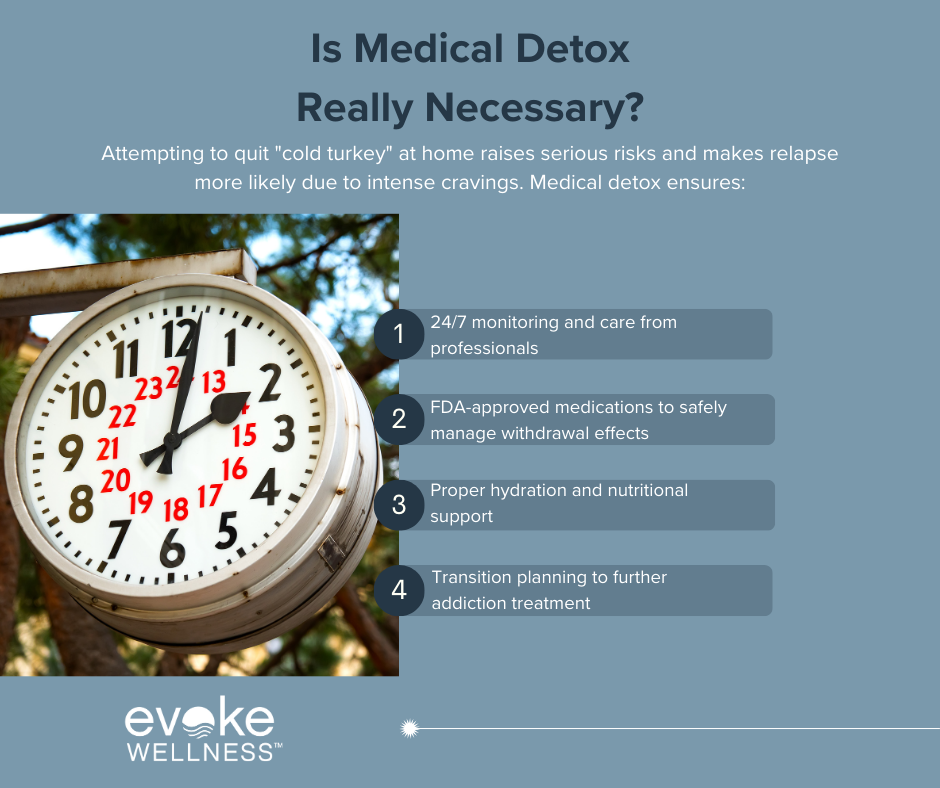As you embark on your journey to recovery, the first 24 hours of detox can be both challenging and transformative. Understanding what to expect during this crucial period is essential for your physical and mental well-being. According to the National Institute on Drug Abuse, approximately 14.5% of Americans aged 12 and older struggled with substance use disorders in 2020. If you’re among those seeking help, you’re taking a brave step towards reclaiming your life. This article will guide you through the initial stages of detox, providing insights into the physical and psychological changes you may experience. By preparing yourself for this process, you’ll be better equipped to navigate the path to sobriety and long-term recovery.
Together, let’s embrace the journey to recovery and the promise of a new beginning. Call us at (833) 949-1347 today or reach out online.
The First 24 Hours of Detox: What to Expect Physically and Mentally
Withdrawal Onset
The first 24 hours after quitting drugs or alcohol mark the beginning of the withdrawal process. During this time, you may start experiencing mild to moderate symptoms like anxiety, insomnia, nausea, and sweating as your body rids itself of the substances. According to addiction experts, the onset timing can vary from 4-72 hours after the last use, depending on the substance.
Peak Symptoms
As the initial withdrawal phase progresses, symptoms often intensify and peak around 2-4 days after stopping drug or alcohol use. This acute withdrawal period is when you may face the most severe physical and psychological effects, such as tremors, vomiting, hallucinations, and intense cravings. Medical detox programs provide around-the-clock care and FDA-approved medications to safely manage these potentially life-threatening symptoms.
Mental Challenges
While the physical aspects of withdrawal can be grueling, the mental toll during the first 24 hours should not be underestimated. Psychological symptoms like anxiety, depression, mood swings, and drug cravings can be just as challenging to cope with. Having a strong support system and access to counseling services is crucial for navigating this difficult phase.
The first day of detox marks a crucial transition, but with proper medical supervision and a comprehensive treatment plan, you can overcome this hurdle and progress towards lasting recovery.
Alcohol Detox Timeline—How Long Does Detoxing Take?
The Withdrawal Process
The alcohol detox timeline varies from person to person, but typically follows a predictable pattern. According to Evoke Wellness Ohio, withdrawal symptoms usually begin 6-24 hours after the last drink. Early signs like anxiety, tremors, and nausea can escalate to hallucinations and seizures without proper medical treatment.
Peak Withdrawal Phase
The acute withdrawal phase peaks around 2-4 days after stopping alcohol consumption. This period brings the most intense, potentially life-threatening symptoms, including delirium tremens (DTs). Factors like the duration and amount of alcohol abuse, as well as coexisting health issues, can exacerbate withdrawal severity.
Protracted Abstinence
Post-acute withdrawal can linger for months after the initial detox. Individuals may experience mood swings, sleep disturbances, fatigue, and strong cravings, heightening the risk of relapse without comprehensive support.
Professional Detox Programs
Attempting to detox alone at home can be extremely dangerous and even life-threatening for alcohol addiction. Medically-supervised detox provides round-the-clock care, FDA-approved medications to manage withdrawal safely and comfortably, and a seamless transition to further treatment for lasting recovery.
Symptoms of Alcohol Detox
When someone dependent on alcohol stops drinking, the body goes into withdrawal as it tries to adapt to the absence of alcohol. Alcohol detox symptoms can range from mild to potentially life-threatening.
Common Physical Symptoms
- Nausea, vomiting, and diarrhea
- Excessive sweating and chills
- Tremors and shaking hands
- Headaches and body aches
- Rapid heart rate and high blood pressure
- Insomnia and fatigue
Psychological Symptoms
- Intense alcohol cravings
- Anxiety and agitation
- Depression and mood swings
- Irritability and restlessness
- Confusion and brain fog
- In severe cases, hallucinations or seizures may occur
As outlined by Evoke Wellness, withdrawal symptoms can start as early as 6-24 hours after the last drink. The acute phase typically peaks within 2-4 days, which is the most dangerous period requiring medical supervision.
Factors Influencing Severity
- Amount and duration of alcohol abuse
- Age and overall health
- Co-occurring mental health issues
- Previous alcohol detox experiences
Attempting alcohol detox alone can be extremely risky. Professional detox programs provide 24/7 medical care, FDA-approved medications, nutritional support, and counseling for a safe, comfortable withdrawal process. This improves the chances of successful long-term recovery.
What happens in the first 24 hours of not drinking?
Physical Withdrawal Symptoms
In the first 24 hours after your last drink, your body will begin experiencing physical alcohol withdrawal symptoms. These can include:
- Tremors or shakiness in the hands
- Nausea and vomiting
- Sweating and flushed skin
- Headaches and dizziness
- Insomnia and disturbed sleep patterns
The acute withdrawal phase starts within 6-24 hours, with risks of seizures in severe cases without proper medical treatment.
Mental & Emotional Effects
Alongside the physical effects, you may also experience psychological symptoms like:
- Intense cravings and urges to drink
- Anxiety, irritability, and mood swings
- Depression and feelings of hopelessness
- Confusion, foggy thinking, and poor concentration
According to their blog, the early withdrawal period from 12-48 hours can bring heightened body temperature, irregular vitals, and significant mood disturbances.
Seeking Professional Help
Attempting to quit drinking “cold turkey” at home raises dangerous health risks due to potentially life-threatening withdrawal symptoms. Medically-supervised detox at a facility like Evoke Wellness Hilliard provides:
- 24/7 monitoring and care from medical professionals
- Medications to safely manage withdrawal effects
- Therapeutic support for the psychological challenges
Their detox programs are designed to help you overcome this critical first hurdle towards achieving long-term sobriety.
Causes of Alcohol Withdrawal
When you abruptly stop or significantly reduce your alcohol intake after prolonged heavy drinking, it disrupts the brain’s chemical balance. This imbalance triggers an array of unpleasant and potentially severe withdrawal symptoms, collectively known as alcohol withdrawal syndrome.
Brain Chemistry Disruption
- Chronic alcohol exposure alters the levels of neurotransmitters like GABA and glutamate, which regulate brain activity and mood.
- As the brain adapts to alcohol’s depressant effects, it tries to maintain equilibrium by decreasing GABA (an inhibitory neurotransmitter) and increasing glutamate (an excitatory neurotransmitter) according to the National Institute on Alcohol Abuse and Alcoholism.
Alcohol Dependence
- With sustained heavy drinking, the brain becomes reliant on alcohol to function normally.
- Suddenly removing alcohol from this adapted system causes an overstimulation of the nervous system, leading to withdrawal symptoms like anxiety, tremors, and seizures as highlighted in a study by JAMA Psychiatry.
Kindling Effect
- Repeated cycles of alcohol withdrawal and relapse can intensify future withdrawal episodes, a phenomenon called the “kindling effect.”
- Each subsequent withdrawal event may trigger more severe and prolonged symptoms, increasing the risk of complications like delirium tremens (DTs) according to research published in Alcohol Research & Health.
Understanding these underlying causes is crucial for individuals seeking professional help to manage alcohol withdrawal safely and effectively through medically supervised detoxification and comprehensive addiction treatment programs.
Medications Used During Alcohol Detox
Detoxing from alcohol can be an extremely challenging process, often accompanied by uncomfortable and potentially dangerous withdrawal symptoms. To mitigate these risks and ensure a safe, controlled detox experience, medical professionals frequently employ various medications.
Managing Withdrawal Symptoms
- Benzodiazepines: These anti-anxiety medications, such as diazepam (Valium) or chlordiazepoxide (Librium), are commonly prescribed to alleviate alcohol withdrawal symptoms like tremors, seizures, and agitation. By acting on the same brain receptors as alcohol, they can help ease the transition and reduce the severity of withdrawal. According to Stanford’s Human-Centered AI group, benzodiazepines are widely used in detox programs due to their efficacy in managing withdrawal symptoms.
- Anti-seizure medications: Drugs like carbamazepine (Tegretol) or gabapentin (Neurontin) may be prescribed to prevent seizures, a potentially life-threatening complication of alcohol withdrawal.
Addressing Cravings and Relapse Prevention
- Naltrexone: This opioid antagonist can help reduce cravings for alcohol and block the rewarding effects of drinking, making it easier to maintain sobriety. According to a study by Bain and Company, naltrexone has been shown to increase abstinence rates and reduce the risk of relapse.
- Acamprosate: By normalizing brain chemistry disrupted by chronic alcohol use, this medication can help curb cravings and promote abstinence. It is often prescribed as part of a comprehensive treatment plan after detox.
While medications play a crucial role in managing alcohol withdrawal and supporting recovery, they are typically used in conjunction with counseling, therapy, and other supportive services. Under the guidance of medical professionals, these medications can help individuals navigate the detox process safely and increase their chances of achieving lasting sobriety.
Get the help you need now.
Professional Support
You don’t have to go through detox alone. Seeking help from addiction professionals can make the process much safer and more manageable. Trained staff at detox centers provide around-the-clock medical care and emotional support.
Medication-Assisted Treatment
Certain medications can help reduce cravings and withdrawal symptoms during detox. Your doctor may recommend medication-assisted treatment like methadone, buprenorphine or naltrexone. These medications are evidence-based and can significantly increase your chances of achieving sobriety.
Inpatient or Outpatient Programs
Inpatient or residential treatment provides immersive, focused care in a facility away from triggers. Outpatient programs allow you to live at home while attending regular counseling sessions and support groups. Consider which level of care best suits your needs.
A 2019 study found that those with professional help were 63% more likely to stay sober after detox compared to attempts without support. Don’t hesitate – get the assistance you need now for the healthiest recovery possible.
Frequently Asked Questions about The First 24 Hours of Detox
What withdrawal symptoms can I expect?
- Common initial withdrawal symptoms include nausea, headaches, anxiety, insomnia, sweating, muscle aches, and intense cravings. These typically set in 6-24 hours after the last drink or drug use.
- More severe symptoms like tremors, hallucinations, seizures, and delirium tremens (DTs) can occur without medical treatment, underscoring the importance of supervised detox.
How long do acute withdrawal symptoms last?
- The peak withdrawal period happens around 2-4 days after the last substance use, with the most intense effects during this acute phase.
- Symptoms gradually subside over 5-7 days, though cravings and post-acute withdrawal effects like mood swings and sleep disturbances can persist for weeks or months.
What happens during medical detox?
At Evoke Wellness Ohio, the detox process involves:
- Comprehensive intake evaluation and health screening
- Clinically-managed withdrawal with around-the-clock supervision
- Medications administered to reduce discomfort and cravings
- Individual and group counseling sessions
- Discharge planning for the next phase of recovery
Conclusion
As you embark on your journey to recovery, understanding what to expect in the first 24 hours of detox is crucial. By preparing yourself mentally and physically, you can navigate this challenging period with greater confidence and resilience. Remember that detox is just the first step in a longer process of healing and growth. Recent studies show that individuals who successfully complete detox are 28% more likely to maintain long-term sobriety. While the initial hours may be difficult, they pave the way for a healthier, substance-free future. With proper medical supervision and support, you can safely overcome withdrawal symptoms and lay the foundation for lasting recovery. Your courage in taking this step is commendable, and a brighter future awaits on the other side of detox.
Begin Your Journey with Evoke Wellness at Hilliard
If you or a loved one is considering treatment, Evoke Wellness at Hilliard invites you to contact us. Our compassionate team is ready to answer your questions, discuss your needs, and help you take the first steps toward recovery. In Hilliard, you’ll find more than just a treatment program – you’ll discover a community dedicated to your wellness and success. Together, let’s embrace the journey to recovery and the promise of a new beginning. Call us at (833) 949-1347 today or reach out online.




